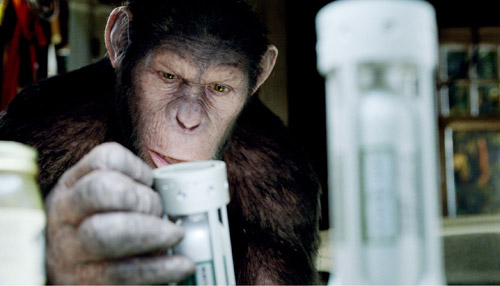
I’ve spent more than my fair share of time railing against CGI, motion capture, and their combined and discrete misuse. In light of 20th Century Fox’s reboot of their classic Planet of the Apes series, I could not be more pleased to be proven wrong.
Andy Serkis has solidified himself a place in film history as the world’s first motion-capture movie star. From Gollum to King Kong to the multitude of simians he portrays in Rise of the Planet of the Apes, he has earned a well-deserved reputation as the go-to guy for motion-capture performances.
He is the true star of Rise, imbuing the aptly-named, hyper-intelligent chimpanzee Caesar with an astonishing range of emotions that most live-action actors would envy. He has clearly studied well the movements and facial expressions of these animals, having done quite a bit of work already on the aforesaid King Kong. The result is a lead character that effectively and believably carries the viewer to the film’s inevitable uprising.
Said uprising comes quite slowly and with a bit of chemical assistance from James Franco as the scientist developing an Alzheimer’s cure that sets the apes’ evolution in motion. This could be considered a cheat if not for the wonderful slow-burn Caesar exhibits in his personal evolution from pet to family member to prisoner, then prisoner to rebel to revolutionary.
Screenwriters Rick Jaffa & Amanda Silver, and director Rupert Wyatt do an excellent job of letting events unfold naturally, each scene building very deliberately upon the last, the injustices meted out in real-world plausibility rather than heavy-handed cruelty, although the film does give us a bad guy in recent Harry Potter alumnus Tom Felton as the disdainful primate reserve animal keeper. He gives an added dose of hissable villainy to the proceedings but his presence is hardly necessary. The apes themselves convey all the necessary emotional angst to win over the viewer. When they finally stage their revolt, it is a moving, cathartic and well-sustained action climax, culminating in a finale that is, while perhaps not outright believable, at the very least acceptable, and not at all objectionable.
As for the CGI creatures themselves, I cannot conceive of a more viable method by which this film could have been realized. By and large I prefer animatronics over computer graphics, but the performances of the motion-capture actors would have been largely lost, though I would be remiss in omitting the fine work done by the CGI animators, as well. If it means fewer live animals needed on set, CGI can proliferate as much as it pleases.
As for the inevitable sequels, I can only hope Fox is wise enough to keep Wyatt, Jaffa and Silver around to bring them to fruition. Sequel elements have already been organically injected into the film, rather than holding everything back for an obligatory post-credits surprise (although there is a rather stellar mid-credits tease).
August is often the time for summer rejects but in a more-or-less mediocre season, Rise of the Planet of the Apes is the rare summer entertainment that manages to be intelligent without being bewildering, thoughtful without being supercilious, and thrilling without being clamorous.
Disagree? That’s fine by me. Share your thoughts below.

You must be logged in to post a comment.